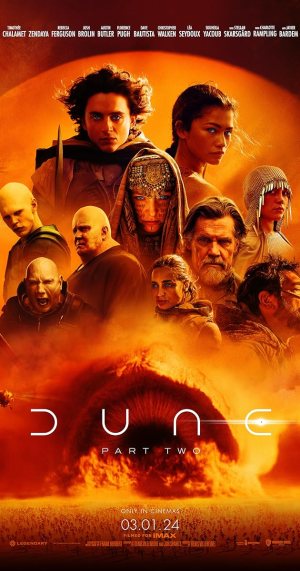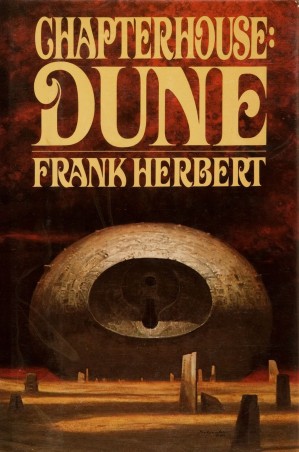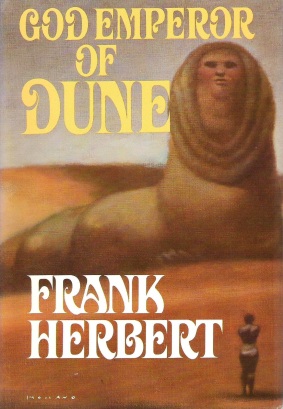 I’ve read Dune for the first time 7 years ago. A year later, I finished Chapterhouse on the day Iain Banks died. I loved the series so much, I tried some of Herbert’s other books too – they all proved to be duds, except for Soul Catcher. I even read what Brian Herbert and Kevin J. Anderson concocted as what was supposed to be the finale, Dune 7 – the so-so Hunters of Dune and the god-awful Sandworms of Dune.
I’ve read Dune for the first time 7 years ago. A year later, I finished Chapterhouse on the day Iain Banks died. I loved the series so much, I tried some of Herbert’s other books too – they all proved to be duds, except for Soul Catcher. I even read what Brian Herbert and Kevin J. Anderson concocted as what was supposed to be the finale, Dune 7 – the so-so Hunters of Dune and the god-awful Sandworms of Dune.
Rereading is always a risk, and I hardly do so. Taste evolves. The thing is: when I first read Dune, I wasn’t that well versed in science fiction. I’d read about 5 Culture novels, Anathem by Stephenson, maybe the Foundation trilogy. I might have been easily impressed. 7 years later, I’ve read a whole lot more of speculative fiction: about 240 titles says my Worlds Without End database. I’ve tried to be broad in my approach, reading older stuff and newer stuff alike. Today, I’m a different judge.
This time, I read the fantastic Folio Society edition, which has an excellent essay by Michael Dirda, and an interesting afterword by Brian Herbert. It’s good to see confirmed that Dune indeed was revolutionary. A book much longer than most other novels of its day – other titles were only a quarter to a third of Dune‘s 215,000 words. That meant an expensive book – “in excess of 5 dollars”, the highest retail price yet for any science fiction novel. And it was not only revolutionary because of its size – it was also an untold commercial succes. While initial sales were slow, it got the Nebula and Hugo awards, and by 1970 the book began to sell well. The sequels became bestsellers too, with sales running into the millions. By 1979 it sold over 10 million copies, and when David Lynch’s 1985 movie adaptation was released, Dune reached no. 1 on the New York Times bestseller list, 20 years after its first publication. Frank Herbert was “the first [science fiction] writer to obtain such high level of readership.”
So, what has this reread told me? What to write about the most lauded science fiction book of all time? Well, easy! That it is within rights and reason to call this one of the greatest books ever – if it falls into your taste range.
My guess is that it will still be read a century from now. Dune has a timeless quality: ditching computers was a genius move by Herbert. In Destination: Void – which was first published in Galaxy Magazine around the same time as Dune – Herbert took the opposite route, embedding a great thriller in pages and pages of computer babble. Even though that babble was realistic at the time, it utterly fails today. Not so with Dune.
There’s hardly anything that can age in this book. Some have argued that the feudal structure of the galactic empire is unrealistic for a far future human world – and as such dated in the 21st century – but that is an utterly naive, Western centrist thought. If the last decade has taught us something, is that we should not take democracy for granted – especially not as global turmoil has only just began at the dawn of disruptive climate change. Who’s so arrogant to claim they have a clear grasp on the arrow of time? Hegel fans? Hari Seldon?
Before I’ll try to shed some more light on why this book remains such a joy to read in 2019 – brace yourselves for a 5444 words analysis of both form and content – let me tackle a bit of critique first. I’d rather have that out of the way, and let the rest of my text be an unapologetic celebration of Herbert’s creation.
(There will be some spoilers throughout, including minor ones about the next 3 books in the series.)
Not everybody likes Dune. Blogger Megan AM, in her 2014 review on From Couch To Moon, worded her problem with the protagonist, Paul, as follows:
If he’s cold, the reader doesn’t care what happens to him. If he’s infallible, he’ll survive every conflict. Wrap him up in a nice blanket of spiritual powers and preordained destiny, with a powerful clan to serve him, and you’ve got the makings of a demigod whose story is predetermined. Dune is worthy warning against allegiance to charismatic personalities, but it’s D.O.A.
Gender pops up a bit further in her review:
Unfortunately, I suspect that many Dune fans actually admire the unearned arrogance of our rich noble-born leader. I worry that Paul’s behavior toward his women and his clansmen actually appeals to many males in the SF community. Paul is in control of everything—his emotions, his actions, his thoughts… even his followers. Even Paul’s mother recognizes his calculating moves as manipulative and unfair. “You deliberately cultivate this air, this bravura,” she charged. “You never cease indoctrinating” (p. 620). How incredibly appealing to a young male…
I think both issues are partly the result of a biased reading – admittedly, something we are all prone too. Yes, older fiction is up to “contemporary dissection” – but the text itself has its rights.
I fully agree that the hero in Dune appeals to readers because of his control, among other things. But there are two problems in Megan’s gendered reading. First are some facts residing in Dune itself. Also Jessica – and to a lesser extent Chani – are in control. They too are heroes of the book. There are other characters who are just as calculating and manipulative, and some of them – all of the Bene Gesserit – are female. Focusing on Paul’s male biological sex seems strange in that light. Moreover, when Paul becomes the Kwisatz Haderach, Herbert explicitly frames this as a fusion of 2 genders, Paul becoming both taker and giver, male and female. Sure, one could debate the problematic dichotomy of that – but either way these facts show the analysis of Megan is a bit superficial.
A second problem is Megan’s own portrayal of “young males” and “many males in the SF community”. I’m sure there are quite a lot of women too who want control over their emotions, thoughts, actions. I think Megan too easily frames Paul’s behavior as a problematic masculine ideal.
To end this first part of my review, let me get back to Megan’s first quote. Paul is “cold” and “infallible”, a “predetermined” “demigod”, and all that could make readers not care for him. Megan is fully right about the predetermined part, but I think exactly that is one of the crucial strengths of the book – I’ll get to that in more detail after the jump.
Yet cold and infallible? One could maybe argue about cold – it is partly in the eye of the beholder – but again, the text itself has its rights. Paul gives moisture to the dead! He does mourn his father – he only has to postpone it, due to the situation he is in. That doesn’t make him cold. It makes him tragic. He has intense friendships with Stilgar and Gurney Halleck. Near the end, he is upset by his mother’s cold shoulder. He struggles emotionally with his own role. And maybe most importantly: he loves & respects Chani deeply, in an explicitly tender way – the ending pages are proof of that. I agree Herbert doesn’t devote lots of page time to these aspects, but they are there. Clearly.
A reader is well within his or her right to think Herbert should have devoted more time to the characters’ emotions – and granted, characterization is not the book’s main focus – but the claim that Paul is cold is not how I experienced it.
One cannot argue about infallible though. Paul fails. He fails spectacularly. Yes, he dethrones the emperor, he marries the princess. But all that is just superficial pomp, not at the heart of this story. It strikes me as odd that Megan AM didn’t mention this. Paul’s failure is even double.
One: his own son is killed. It is one of the pivotal moments of the book – even without taking into account the strong emphasis Herbert puts on the importance of genes and bloodlines. More so, the death of his firstborn is one of the pivotal moments of the entire series, with possibly galactic repercussions. “He felt emptied, a shell without emotions. Everything he touched brought death and grief. And it was like a disease that could spread across the universe.” Two: Paul’s main drive in the book is to prevent the jihad, yet he fails to do so. That only becomes fully clear in the sequels, but still, it is spelled out explicitly multiple times.
Herbert didn’t write Paul as a true masculine infallible hero. He is noble-born, strong and superbly trained, yes, but he is more than that, and morally ambiguous. It is when his firstborn son dies that – maybe? – Paul embraces jihad as cosmic revenge for all the suffering he had to endure. “Something seemed to chuckle and rub its hands within him. And Paul thought: How little the universe knows about the nature of real cruelty!” Herbert doesn’t spoon-feed it to the reader. It is unclear how to interpret that italic sentence, but either way, it is one of many that makes Paul human – somebody this reader could connect to.
Before I’ll dive into a more substantial analysis, the following needs emphasis: reading Dune was even better the second time around. One part of that is that I was familiar with its world – the first half can be tough on new readers that don’t know what’s going on. Another part is that I have become more experienced as reader, seeing both the book’s literary mechanics and its philosophical implications much clearer – and because of that I appreciate it all the more.
Books that can be reread don’t hinge on novelty & surprise alone. There is no better testament to what Herbert achieved artistically. Please join me in celebrating the how & what of Dune some more!
I’ll first highlight a few technical issues: Herbert’s prose, his plotting power – including a detailed case study of the first knife fight, between Paul and Jamis. After that, I’ll zoom in on Dune‘s tragic philosophical content.
Continue reading →
 Let me first repeat some stuff from the intro to my Dune: Part One review.
Let me first repeat some stuff from the intro to my Dune: Part One review. 





 I’ve always considered the Dune series the best SF I’ve ever read, but as I read it fairly early in my ventures into SF, a reread is in order. Do my past opinions still hold, years & years and books & books later?
I’ve always considered the Dune series the best SF I’ve ever read, but as I read it fairly early in my ventures into SF, a reread is in order. Do my past opinions still hold, years & years and books & books later? I’ve read Dune for the first time 7 years ago. A year later, I finished Chapterhouse on the day Iain Banks died. I loved the series so much, I tried some of Herbert’s other books too – they
I’ve read Dune for the first time 7 years ago. A year later, I finished Chapterhouse on the day Iain Banks died. I loved the series so much, I tried some of Herbert’s other books too – they 









